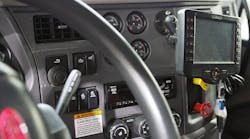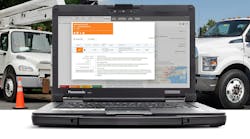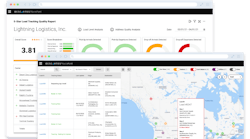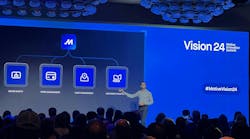By now carriers and drivers required to comply with the electronic logging device (ELD) mandate should be comfortable using their devices and ready to submit their required hours of service information to an enforcement officer during a roadside inspection with little-to-no hiccups, right? That's in a perfect world.
In the real world, questions and concerns still loom, there are still some smaller carriers and independent drivers who have not selected an ELD, and let's face it, even though enforcement officially went into effect on April 1, DOT inspectors are still trying to figure things out as they go during the inspection process.
For those having trouble with their devices, or those who are still in the market looking for a device, we've listed some of the pros and cons for a BYOD (bring your own device) and installing a device in your tractor.
Having your drivers bring their own devices into their vehicles for ELD and telematics solutions might seem like a great way to save the company money and give drivers the flexibility to use a personal smartphone or tablet they know and like. But it could also lead your fleet down a rabbit hole of multiple vendors, mobile device management problems, security risks, and additional licensing and data costs.
The flexibility of BYOD can be alluring: It’s 2018 and most drivers have their own smartphone, so why not just have them download an app? This certainly would be less of an upfront cost to fleets than purchasing vehicle-installed electronic logging devices to log and monitor hours of service (HOS).
Fleet telematics solutions companies, such as GPS Insight, are quick to point out that while BYOD options appear to be less expensive because of upfront costs, if you do the math for the long run, there are more benefits to gain from a comprehensive ELD solution. The company provided these potential disadvantages to BYOD:
- Is it cheaper? With BYOD you might pay for ELD service per driver instead of per vehicle if you have more vehicles than drivers.
- Limited choices: You might have to choose between Android and iPhone as not all vendors support both operating systems.
- Not tough enough: Consumer-grade BYODs are not designed for harsh commercial transportation environments.
- Distracted driving fines: Since CDL drivers are not allowed to hold or interact with their phone or tablet while the vehicle is in motion, a simple ELD click could lead to a distracted driving ticket.
- Paying for employee’s data: Your drivers will need a good data plan to keep the ELD and telematics apps connected. And that will likely come down to a mobile phone stipend that could just as easily go toward the cost of an installed ELD.
- Lost or damaged: What happens when a driver’s phone breaks or an older smartphone dies? Do you want to risk your data on a device you didn’t select?
- Forgotten device: What if your driver forgets his or her phone or tablet at home? They can’t collect e-log data or be compliant with ELD laws.
- Charging: Keeping a smartphone charged all day long can be a challenge, and if a BYOD ELD dies, your driver might not have up-to-date e-logs for DOT roadside inspections.
Vehicle-installed ELD solutions not only make individual fleet vehicles compliant with the law, they give fleets more benefits, GPS Insight argues, such as:
- More value, less overall costs: The monthly price for vehicle-installed ELD is calculated per truck, not per driver.
- Data is included: Data is typically included with installed ELDs, depending on the vendor.
- Safer: ELDs typically have a lockout feature to prevent interaction while the vehicle is in motion. This helps keep the driver’s attention on the road, thus reducing the chance of distracted driving fines.
- GPS tracking: ELDs typically include GPS tracking as part of the device and data plan.
“GPS Insight places a tremendous emphasis on product quality and integrity,” said Elliot Batcheller, the company vice president of operations. “We exercised extreme diligence in undergoing the Federal Motor Carrier Safety Administration’s ELD certification process to uphold our standards of excellence.”
That quality and integrity, GPS Insight stressed, is something that comes with dedicated vehicle devices—because they are only used for vehicle telematics—unlike your driver’s smartphone, which is used for so much more.
Other companies, such as ELD Solutions (ELDS) are still focusing on offering fleets both options: dedicated devices and BYOD solutions. According to ELDS vice president Jeffrey Farrington, with both you and your fleet can go with simple ELD compliance to a full suite of telematics tools and asset tracking.
ELDS also offers customers rugged tablets that are either assigned to a driver or a vehicle, based on a company’s needs. “One of our primary goals is to provide the easiest-to-implement electronic logging device for the trucking industry,” Farrington said. “From ordering to installation and training, ELDS is the simplest solution for both companies and drivers alike. Our goal is to help carriers use the mandate to their advantage.”
Cybersecurity is nothing to cut corners on these days, said Fred Fakkema, vice president of compliance at Zonar Systems, a smart fleet management company. He added that purpose-built devices are designed to be more secure for fleets. Unlike BYOD, a purpose-built device doesn’t typically require add-on security software as those features are built in. But with BYOD, you could be required to use multiple vendors to secure your driver’s device. The more vendors that are involved, the more things that can go wrong.
Along with cybersecurity, Zonar argued that a purpose-built device comes with some old-fashioned security too. An installed ELD is for a particular system, so it’s less appealing to would-be thieves.
And when it comes to trucking and shipping, mobile-device purchasing and responsibility is best left to the fleet owner, said Ron Hassanwalia, COO of SOTI, a business mobility company.
“In transportation industries, there are fundamental and even legal issues around devices owned by drivers,” he said. “Privacy is an example, since fleet owners would have less leverage on devices they do not own. A driver who comes to work with a smartphone may not want the boss tracking their GPS, but if the driver removes the GPS applications, they may not be able to perform their job effectively.”
Fleet owners should want their mission-critical devices working reliably all the time, Hassanwalia stressed, because the net opportunity cost of the business is much higher than the cost of the mobile system. “What might seem as extra costs to a driver would be a non-issue for a business owner,” he said.
“In a bring-your-own-device scenario, there is always the conundrum of who pays for a device if it breaks on the job (the device owner, the employee, or the business/company),” Hassanwalia added. “Hence, mobile device purchasing and responsibility is best left to the fleet owner.”
Crestwood Transportation, a nationwide fleet for Crestwood Equity Partners’ growing natural gas business, installed PeopleNet solutions in its trucks. PeopleNet, a Trimble company that provides fleet mobility technology, provided Crestwood with in-cab tablets and ticket printing capabilities. The PeopleNet solutions integrate with Trimble’s TMW business to streamline the in-cab interface with dispatch.
While upfront costs might appear as a deterrent for some fleets when weighing an installed ELD and telematics system versus a BYOD solution, the security and control of an installed system should outweigh most concerns for most fleets.




